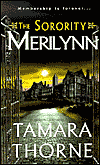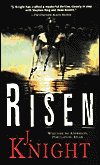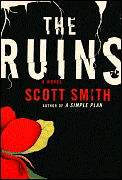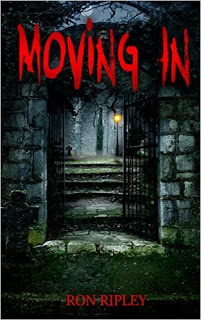
Merilynn, by Tamara Thorne
Book Review by Mark Deniz
Have you read this book?
Those having read my less than enthusing review of the first book in this trilogy may wonder at the reasons for me following that up with a review of the second in the series. Simply put, without knowing too much about this particular author or her work, I was intrigued by affirmations from talented author Chelsea Quinn Yarbro, and agreed to read and review the whole trilogy.
"Not every dream is sweet"
Printed entirely in upper case the above quote graces the back cover of book two and is a direct reference to Merilynn's less than ordinary personality. As I mentioned in my first review, Merilynn is, without question, the most interesting character within the trilogy and I had faint hopes that the books would pick up a tad, now that insipid Eve was gone and that Merilynn herself would be taking centre stage.
Due to Merilynn's psychic abilities, she is aware that things are not as they should be in her sorority house and when Malory Thomas (still an awful name as a homage) invites her to join the Fata Morgana, her senses are affected even more. Her dreams become more intense and hint at something that is soon to happen, which relates to something in the sorority's past, something that links what the girls saw that fateful day and that Malory Thomas would rather was not discovered.
Unfortunately, Merilynn begins in very much the same way as "Eve" ended, and without any sort of improvement of writing style, it is clear to see that this trilogy is going to be a dud throughout. The story itself is juvenile and again I wondered why it was not listed as YA, as my review would be much kinder given this information.
I have been rather shocked that Yarbro has been positive about Thorne and further surprised when reading the critic's choice quotes on the volumes' back cover as they all hint at terror, of spine-tingling suspense that I have failed to find within a single page of the 220 on offer in this volume.
Even with Merilynn as protagonist, she is still not a truly powerful character, merely that she is the one I would rather read about in the trilogy. Samantha's cynical nature and scepticism becomes more infuriating with every page and Kendra seems to have been given the role of what we, the reader, are thinking and feeling while the trilogy progresses. Sadly this has not the desired effect and I very much saw this as an assignment, a case of, finish the book as quickly as possible, write the review and forget all about it.
It seems harsh but there has been much said about these books and my expectation was maybe higher than it should be. Nevertheless I demand that my horror is scary, or disturbing, or both. This is neither and I find it hard to find a suitable categorisation with which to enable interested readers to choose books such as this, that is if your interests contain insipid characters in a horror novel that does not conform to many of horror's requirements.
If you've been lucky enough to avoid Thorne's Sorority trilogy so far then keep your distance. If you've come this far I would strongly advise you to turn back before it is too late.
"Not every dream is sweet"
Printed entirely in upper case the above quote graces the back cover of book two and is a direct reference to Merilynn's less than ordinary personality. As I mentioned in my first review, Merilynn is, without question, the most interesting character within the trilogy and I had faint hopes that the books would pick up a tad, now that insipid Eve was gone and that Merilynn herself would be taking centre stage.
Due to Merilynn's psychic abilities, she is aware that things are not as they should be in her sorority house and when Malory Thomas (still an awful name as a homage) invites her to join the Fata Morgana, her senses are affected even more. Her dreams become more intense and hint at something that is soon to happen, which relates to something in the sorority's past, something that links what the girls saw that fateful day and that Malory Thomas would rather was not discovered.
Unfortunately, Merilynn begins in very much the same way as "Eve" ended, and without any sort of improvement of writing style, it is clear to see that this trilogy is going to be a dud throughout. The story itself is juvenile and again I wondered why it was not listed as YA, as my review would be much kinder given this information.
I have been rather shocked that Yarbro has been positive about Thorne and further surprised when reading the critic's choice quotes on the volumes' back cover as they all hint at terror, of spine-tingling suspense that I have failed to find within a single page of the 220 on offer in this volume.
Even with Merilynn as protagonist, she is still not a truly powerful character, merely that she is the one I would rather read about in the trilogy. Samantha's cynical nature and scepticism becomes more infuriating with every page and Kendra seems to have been given the role of what we, the reader, are thinking and feeling while the trilogy progresses. Sadly this has not the desired effect and I very much saw this as an assignment, a case of, finish the book as quickly as possible, write the review and forget all about it.
It seems harsh but there has been much said about these books and my expectation was maybe higher than it should be. Nevertheless I demand that my horror is scary, or disturbing, or both. This is neither and I find it hard to find a suitable categorisation with which to enable interested readers to choose books such as this, that is if your interests contain insipid characters in a horror novel that does not conform to many of horror's requirements.
If you've been lucky enough to avoid Thorne's Sorority trilogy so far then keep your distance. If you've come this far I would strongly advise you to turn back before it is too late.
|
Click here to buy Merilynn, by Tamara Thorne on Amazon
|
Merilynn, by Tamara Thorne on Amazon

| More Books You Might Like |
Comment on Merilynn, by Tamara Thorne
| Comments on Merilynn, by Tamara Thorne |
| There are no comments on this book. |



